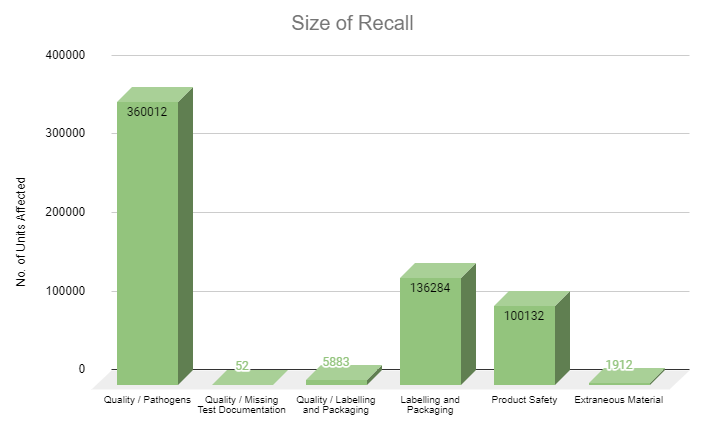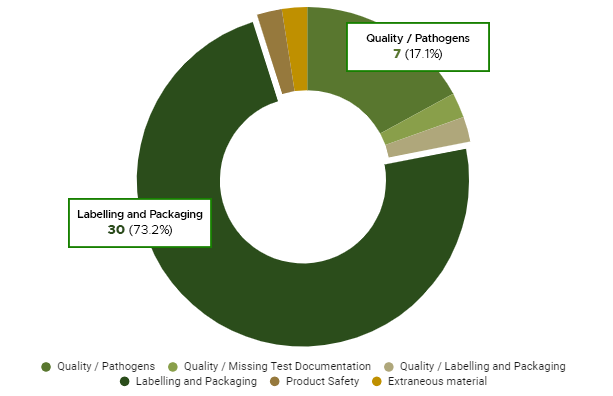Three years ago, Canada became one of the first countries in the world to legalize and regulate cannabis. We’ve covered various aspects of cannabis regulation since, but now with a few years of data readily available, it’s time to step back and assess: what can we learn from three years of cannabis recalls in the world’s largest legal market?
Labelling Errors are the Leading Cause of Canadian Cannabis Recalls
Our analysis of Health Canada’s data revealed a clear leader: most cannabis recalls since legalization in October 2018 have been due to labelling and packaging errors. In fact, over three quarters of total cannabis recalls were issued for this reason, covering more than 140,000 units of recalled product.
The most common source of labelling and packaging recalls in the cannabis industry (more than half) is inaccurate cannabinoid information. Peace Naturals Project’s recall of Spinach Blue Dream dried cannabis pre-rolls this year is a good example. Not only did the packaging incorrectly read that the product contained CBD, but the THC quantity listed was lower than the actual amount of THC in the product. The recall covered over 13,000 units from a single lot sold over 10 weeks.
In another example, a minor error made a huge impact. British Columbia-based We Grow BC Ltd. experienced this firsthand when it misplaced the decimal points in its cannabinoid content. The recalled products displayed the total THC and CBD values as 20.50 mg/g and 0.06 mg/g, respectively, when the products contained 205.0 mg/g and 0.6 mg/g.
Accurate potency details are not just crucial for compliance. For many customers, potency is a deciding factor when selecting a cannabis product, and this is especially important for medicinal users (including children), people who are sensitive to certain cannabinoids and consumers looking for non-psychoactive effects. In this case, at least six consumer complaints were submitted to Peace Naturals Project, the highest number for any cannabis recall in Canada.
Frequent, integrated lab testing, an effective and robust traceability system, smaller lot sizes during production and consistent quality checks could have helped Peace Naturals Project and We Grow BC limit the scope of their recall or avoid them altogether.
Pathogens are the #2 Cause of Cannabis Recalls in Canada
Pathogens are the second most common cause of recalls in Canada, claiming 18% of total cannabis recall incidents. And while that doesn’t sound like much compared to the recalls caused by labelling errors, it affects the highest volume of product recalled with over 360,000 units affected.

A primary cause of allergens and microbiological contamination of cannabis products is yeast, mold and bacteria found on cannabis flower (chemical contaminants like pesticides can also be a major concern). Companies like Atlas Growers, Natural MedCo and Agro-Greens Natural Products have all learned this lesson through costly recalls.
These allergenic contaminants pose an obvious health risk, often leading to reactions such as wheezing, sneezing and itchy eyes. For people using cannabis for medical conditions and may be more susceptible to illness, pathogens can cause more serious health complications. Moreover, this type of cannabis recall not only drives significant cost since microbiological contamination of flower could easily affect several product batches processed in the same facility and/or trigger downstream recalls, but also affect consumer confidence for established cannabis brands.
Preventive control plan requirements for cannabis manufacturers mandate that holders of a license for processing that produce edible cannabis or cannabis extracts in Canada must identify and analyze the biological, chemical and physical hazards that present a risk of contamination to the cannabis or anything that would be used as an ingredient in the production of the edible cannabis or cannabis extract. Biological hazards can come from a number of sources, including:
- Incoming ingredients, including raw materials
- Cross-contamination in the processing or storage environment
- Employees
- Cannabis extract, edible cannabis and ingredient contact surfaces
- Air
- Water
- Insects and rodents
To mitigate risks, addressing root causes with preventative measures and controls is essential. For instance, high humidity levels and honeydew secreted by insects are common causes of mold on cannabis flowers. Measures such as leaving a reasonable distance between plants, using climate-controlled areas to dry flowers, applying antifungal agents and conducting regular tests are necessary to combat such incidents.

Of course, placing all the necessary controls into action is not as simple as it may sound. Multiple facilities and a wide range of products in production mean more complexity for cannabis producers and processors. Any gaps in processing flower, extracts or edibles can result in an uncontrolled safety hazard that may lead to a costly cannabis recall.
These challenges are not just limited to cannabis growers. The food industry has been effectively mitigating the risk of biological hazards for decades with the help of food ERP solutions.
Avoid Recalls Altogether with Advanced ERP Technology
An effective preventative control plan with regular quality checks, internal audits and standardized testing is important to minimize the threats evident from Canada’s recall data. If these measures ever fail, real-time traceability systems play a pivotal role in the event of a cannabis recall by enabling manufacturers to trace back incidents to the exact point of contamination and identify affected products with surgical precision.
Instead of starting from zero, savvy cannabis industry leaders turn to the proven solutions from the food industry and take advantage of data-driven, automated systems that deliver the reliability and safety that the growing industry needs. From automated label generation to integrated lab testing to quality checks to precision traceability and advanced reporting, production and quality control systems are keys to success for the years ahead.


